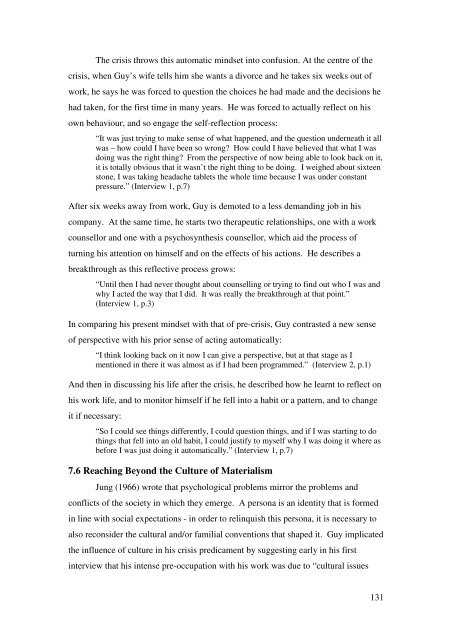DEVELOPMENTAL CRISIS IN EARLY ADULTHOOD: A ...
DEVELOPMENTAL CRISIS IN EARLY ADULTHOOD: A ...
DEVELOPMENTAL CRISIS IN EARLY ADULTHOOD: A ...
Create successful ePaper yourself
Turn your PDF publications into a flip-book with our unique Google optimized e-Paper software.
The crisis throws this automatic mindset into confusion. At the centre of the<br />
crisis, when Guy’s wife tells him she wants a divorce and he takes six weeks out of<br />
work, he says he was forced to question the choices he had made and the decisions he<br />
had taken, for the first time in many years. He was forced to actually reflect on his<br />
own behaviour, and so engage the self-reflection process:<br />
“It was just trying to make sense of what happened, and the question underneath it all<br />
was – how could I have been so wrong? How could I have believed that what I was<br />
doing was the right thing? From the perspective of now being able to look back on it,<br />
it is totally obvious that it wasn’t the right thing to be doing. I weighed about sixteen<br />
stone, I was taking headache tablets the whole time because I was under constant<br />
pressure.” (Interview 1, p.7)<br />
After six weeks away from work, Guy is demoted to a less demanding job in his<br />
company. At the same time, he starts two therapeutic relationships, one with a work<br />
counsellor and one with a psychosynthesis counsellor, which aid the process of<br />
turning his attention on himself and on the effects of his actions. He describes a<br />
breakthrough as this reflective process grows:<br />
“Until then I had never thought about counselling or trying to find out who I was and<br />
why I acted the way that I did. It was really the breakthrough at that point.”<br />
(Interview 1, p.3)<br />
In comparing his present mindset with that of pre-crisis, Guy contrasted a new sense<br />
of perspective with his prior sense of acting automatically:<br />
“I think looking back on it now I can give a perspective, but at that stage as I<br />
mentioned in there it was almost as if I had been programmed.” (Interview 2, p.1)<br />
And then in discussing his life after the crisis, he described how he learnt to reflect on<br />
his work life, and to monitor himself if he fell into a habit or a pattern, and to change<br />
it if necessary:<br />
“So I could see things differently, I could question things, and if I was starting to do<br />
things that fell into an old habit, I could justify to myself why I was doing it where as<br />
before I was just doing it automatically.” (Interview 1, p.7)<br />
7.6 Reaching Beyond the Culture of Materialism<br />
Jung (1966) wrote that psychological problems mirror the problems and<br />
conflicts of the society in which they emerge. A persona is an identity that is formed<br />
in line with social expectations - in order to relinquish this persona, it is necessary to<br />
also reconsider the cultural and/or familial conventions that shaped it. Guy implicated<br />
the influence of culture in his crisis predicament by suggesting early in his first<br />
interview that his intense pre-occupation with his work was due to “cultural issues<br />
131
















